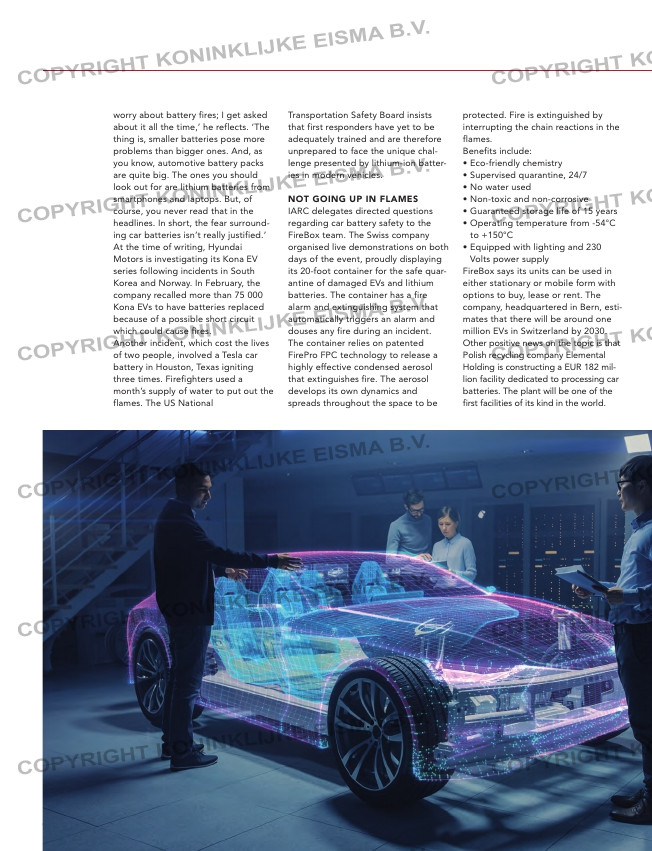Page 68 from: Recycling International July issue | 2021 + TOP 100!

68
new on the scene:
wAtt4eVer
With the arrival of e-mobility, energy
storage systems will be a big part of
the future of car recycling, according
to Catherine Lenaerts of Febelauto.
The Belgian car recycling organisation
has set up a new venture called
Watt4Ever to develop energy storage
solutions from collected used car bat-
teries. The first pilot facility opened in
June 2020 with Flemish Minister of
Mobility Lydia Peeters attending the
inauguration.
‘Approximatively 20% of used battery
packs are directed to a destination
other than recycling,’ says Lenaerts,
who is also ceo of Watt4Ever. ‘Our
ambition is to increase this ratio by giv-
ing these batteries a new life in energy
storage systems. Whenever this is not
possible, we will send them to recycling
to retrieve valuable raw materials.’
E-scrap and battery recycler Out of
Use is contracted to collect all batter-
worry about battery fires; I get asked
about it all the time,’ he reflects. ‘The
thing is, smaller batteries pose more
problems than bigger ones. And, as
you know, automotive battery packs
are quite big. The ones you should
look out for are lithium batteries from
smartphones and laptops. But, of
course, you never read that in the
headlines. In short, the fear surround-
ing car batteries isn’t really justified.’
At the time of writing, Hyundai
Motors is investigating its Kona EV
series following incidents in South
Korea and Norway. In February, the
company recalled more than 75 000
Kona EVs to have batteries replaced
because of a possible short circuit
which could cause fires.
Another incident, which cost the lives
of two people, involved a Tesla car
battery in Houston, Texas igniting
three times. Firefighters used a
month’s supply of water to put out the
flames. The US National
Transportation Safety Board insists
that first responders have yet to be
adequately trained and are therefore
unprepared to face the unique chal-
lenge presented by lithium-ion batter-
ies in modern vehicles.
not going up in FLAmes
IARC delegates directed questions
regarding car battery safety to the
FireBox team. The Swiss company
organised live demonstrations on both
days of the event, proudly displaying
its 20-foot container for the safe quar-
antine of damaged EVs and lithium
batteries. The container has a fire
alarm and extinguishing system that
automatically triggers an alarm and
douses any fire during an incident.
The container relies on patented
FirePro FPC technology to release a
highly effective condensed aerosol
that extinguishes fire. The aerosol
develops its own dynamics and
spreads throughout the space to be
protected. Fire is extinguished by
interrupting the chain reactions in the
flames.
Benefits include:
• Eco-friendly chemistry
• Supervised quarantine, 24/7
• No water used
• Non-toxic and non-corrosive
• Guaranteed storage life of 15 years
• Operating temperature from -54°C
to +150°C
• Equipped with lighting and 230
Volts power supply
FireBox says its units can be used in
either stationary or mobile form with
options to buy, lease or rent. The
company, headquartered in Bern, esti-
mates that there will be around one
million EVs in Switzerland by 2030.
Other positive news on the topic is that
Polish recycling company Elemental
Holding is constructing a EUR 182 mil-
lion facility dedicated to processing car
batteries. The plant will be one of the
first facilities of its kind in the world.
64-65-66-67-68-69_iarchighlights.indd 68 06-07-21 14:07



